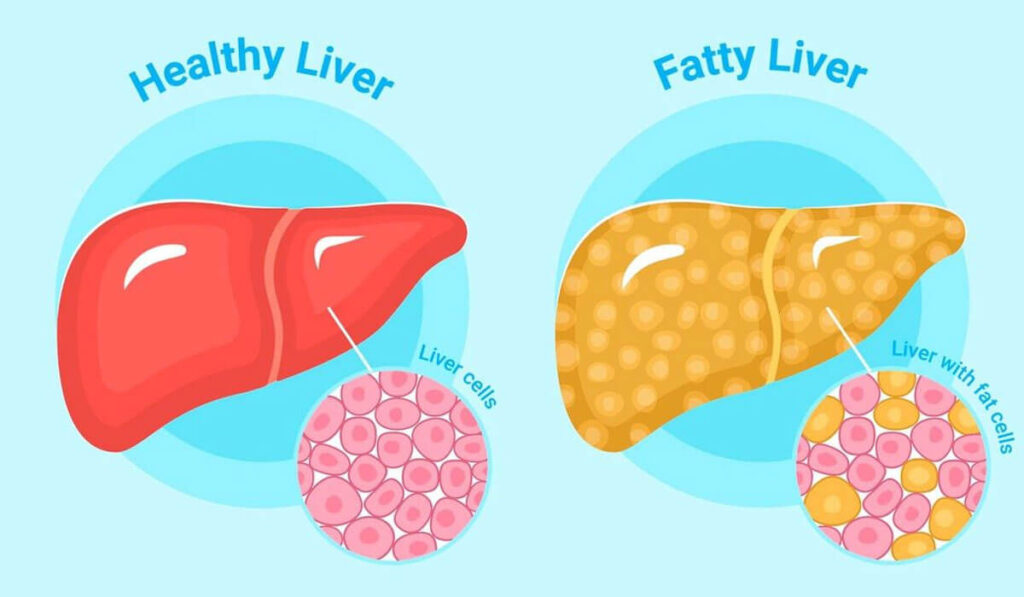What Vitamin Helps with a Fatty Liver? What are some famous quotes for Fatty liver syndrome and diabetes mellitus?

The Secrets to a Healthy Liver: Your Ultimate Guide to Combatting Fatty Liver Disease
Fatty liver disease, scientifically known as hepatic steatosis, is a prevalent health concern marked by the accumulation of excess fat within the liver. Rooted in factors such as obesity, poor dietary choices, alcohol consumption, and specific medical conditions, this condition poses a considerable threat to liver health. In this all-encompassing guide, we delve into the vitamins crucial for managing and preventing fatty liver disease.
Effect of Fatty liver:-
Before we unveil the vitamin superheroes, it’s vital to comprehend the profound impact of fatty liver disease on both the liver and overall well-being. Categorized into two main types—Non-Alcoholic Fatty Liver Disease (NAFLD) and Alcoholic Fatty Liver Disease (AFLD)—this condition, if left untreated, can progress to advanced stages, potentially resulting in liver fibrosis, cirrhosis, and failure. Strategic lifestyle adjustments, including dietary changes and targeted vitamin supplementation, are key to managing these conditions effectively.
The Vitamin Arsenal for Liver Support
1. Vitamin A: Essential for normal liver function, maintaining a balanced level is paramount to prevent liver damage. Abundant in foods like sweet potatoes, carrots, and spinach, vitamin A contributes to robust liver support.
2. Vitamin B Complex: Including B1, B2, B3, B6, B9, and B12, these vitamins are vital for energy metabolism, detoxification, and the synthesis of liver enzymes. A balanced intake is crucial for overall liver health.
3. Vitamin B5 (Pantothenic Acid): Involved in fatty acid metabolism, vitamin B5 contributes to the breakdown of fats in the liver, complementing other liver-healthy strategies.
4. Vitamin C: An antioxidant powerhouse, vitamin C protects the liver from oxidative stress, potentially reducing inflammation and improving enzyme levels. While not a standalone cure, vitamin C is a valuable addition to a liver-healthy diet.
5. Vitamin D: Renowned for its roles in bone health and the immune system, emerging research links vitamin D to improved liver health. Correcting vitamin D deficiency may enhance liver function and reduce inflammation, although more research is needed for a comprehensive understanding.
6. Vitamin E: A fat-soluble antioxidant, vitamin E shields liver cells from oxidative stress and free radical damage. Studies indicate that vitamin E supplementation can reduce liver fat and inflammation in those with NAFLD, enhancing overall liver function.
7. Vitamin K: Essential for proper blood clotting, vitamin K also aids in producing proteins that regulate clotting and reduce inflammation.
Unlocking the Bounty from Your Plate, please ensure your diet includes an array of foods to secure these essential vitamins for liver health:
- Vitamin E: Nuts, seeds, vegetable oils, spinach, and broccoli.
- Vitamin D: Fatty fish, egg yolks, fortified dairy, and sunlight exposure.
- Vitamin C: Citrus fruits, strawberries, kiwi, bell peppers, and broccoli.
- B-Complex Vitamins: Whole grains, lean meats, fish, eggs, dairy, leafy greens, and legumes.
- Vitamin A: Sweet potatoes, carrots, spinach, kale, butternut squash, and liver (in moderation).
- Vitamin K: Leafy greens, broccoli, Brussels sprouts, and green tea.
- Vitamin B5: Whole grains, mushrooms, avocados, and meat.
Supplementing Wisely
While a balanced diet is ideal, some individuals may benefit from vitamin supplements. Consult with a healthcare professional to ensure safe and effective supplementation, especially for vitamins D and E. Controlled doses are crucial to prevent adverse effects.
Lifestyle: The Cornerstone of Liver Health
In conjunction with vitamin support, lifestyle modifications are paramount for managing and preventing fatty liver disease:
- Weight Management: Attaining and sustaining a healthy weight through diet and exercise reduces liver fat and enhances function.
- Balanced Diet: Prioritize fruits, vegetables, whole grains, lean proteins, and healthy fats while limiting sugary, fatty foods, and alcohol.
- Regular Exercise: Engage in aerobic and strength training to improve insulin sensitivity, promote weight loss, and reduce liver fat.
- Avoid Alcohol: Crucial for those with AFLD, eliminating or minimizing alcohol intake prevents further liver damage.
- Manage Chronic Conditions: Effectively handle conditions like diabetes and high cholesterol, contributing factors to fatty liver disease.
- Monitor Medications: Consult healthcare providers to assess and adjust medications that may contribute to liver damage.
In the realm of fatty liver disease, a holistic approach embracing vitamins, lifestyle adjustments, and medical guidance empowers individuals to stride confidently toward optimal liver health and overall wellness.
Hope it cover all related to Fatty liver syndrome, its effects and Balanced diet.